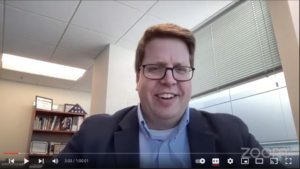Media contact: National Consumers League – Katie Brown, katie@nclnet.org, (202) 207-2832
April 1, 2022
The Honorable Jonathan Kanter
Assistant Attorney General
Antitrust Division
United States Department of Justice
950 Pennsylvania Avenue, NW
Washington, DC 20530-0001
RE: National Consumers League support for investigation of anti-competitive practices in the live event ticketing industry
Dear Assistant Attorney General Kanter,
On March 15, 2022, Senators Richard Blumenthal and Amy Klobuchar urged the Department of Justice (“the Department”) to investigate the state of competition in the live-event marketplace, including potential violations of Live Nation-Ticketmaster’s updated consent decree.[1] The National Consumers League, America’s oldest consumer advocacy organization, supports Senator Blumenthal’s and Senator Klobuchar’s request for the Department to take action on the issue of live entertainment marketplace competition.
As the Department is aware, just one company, Live Nation Entertainment (“LNE”), controls roughly 80% of the primary ticketing market following Live Nation’s vertical
integration with Ticketmaster.[2] In the Department of Justice’s own words, Ticketmaster benefits from “high barriers to other companies successfully, substantially, and profitably entering or attempting to expand in the market for primary ticketing services to major concert venues.”[3] There is no indication that the Live Nation-Ticketmaster merger (and further monopolistic actions since 2010) have reduced these barriers to entry.[4]
In fact, anticompetitive behavior in the live-event marketplace is so egregious that the Department was forced to obtain an updated consent decree with LNE in 2020.[5] Although the modified final judgement was a welcome act, consumers still suffer due to many of LNE’s business practices.[6] Since the announcement of the updated consent decree, Live Nation has continued to eliminate marketplace competitors, including an acquisition that received the Department’s approval.[7]
As a result of toxic market practices, concert attendees, sports fans, theater enjoyers, and other live-event goers must endure punishing hidden fees. In 2018, the Government Accountability Office found that on average, purchasers paid an additional 27% of the ticket’s original value in fees.[8] Recent media reports have found fees as high as 78% of the ticket’s starting price.[9] This is after consumers must contend with scalpers employing illegal ticket-buying “bot” software and other unscrupulous methods in order to even secure their tickets.[10]
The unfortunate state of the live entertainment marketplace warrants an investigation by the Department—with specific attention to LNE’s compliance with the updated consent decree. The harmful impacts of LNE’s near-monopoly are unacceptable. We urge the Department to conduct a thorough investigation of these practices and, if necessary, take action to ensure market health and consumer protection.
Sincerely,
Sally Greenberg
Executive Director
National Consumers League
[1] United States Senator Richard Blumenthal. Blumenthal & Klobuchar Urge DOJ Action to Restore Competition in the Concert & Live Entertainment Market. (March 2022). https://www.blumenthal.senate.gov/newsroom/press/release/blumenthal-and-klobuchar-urge-doj-action-to-restore-competition-in-the-concert_live-entertainment-market
[2] United States Government Accountability Office. Event Ticket Sales: Market Characteristics and Consumer Protection Issues. (April 2018). Pg. 4. https://www.gao.gov/assets/gao-18-347.pdf
[3] United States Department of Justice. Competitive Impact Statement, United States of America v. Live Nation Entertainment, Inc., No. 1:10-cv-00139 (D. D.C. Jan. 25, 2010). https://www.justice.gov/atr/case-document/competitive-impact-statement-209
[4] The Hollywood Reporter. Live Nation Accused of Shutting Out Venues That Don’t Use Ticketmaster. (January 2022). https://www.hollywoodreporter.com/business/business-news/live-nation-ticketmaster-class-action-1235070131/; Ticket News. Ticketmaster Resale Returns to Broker-Focused Conferences Despite Past Controversy. (July 2021). https://www.ticketnews.com/2021/07/ticketmaster-resale-returns-to-broker-focused-conferences-despite-past-controversy/
[5] United States Department of Justice. Justice Department Will Move to Significantly Modify and Extend Consent Decree with Live Nation/Ticketmaster. (December 2019). https://www.justice.gov/opa/pr/justice-department-will-move-significantly-modify-and-extend-consent-decree-live
[6] Variety. John Oliver Blasts Ticketmaster in Scathing Broadside Against Ticket Prices, Fees, Secondary Market. (March 2022). https://variety.com/2022/music/news/john-oliver-ticketmaster-prices-fees-secondary-market-1235204410/
[7] Complete Music Update. Ticketmaster gets approval for deal to buy Rival. (April 2020). https://completemusicupdate.com/article/ticketmaster-gets-approval-for-deal-to-buy-rival/
[8] United States Government Accountability Office. Event Ticket Sales: Market Characteristics and Consumer Protection Issues. (April 2018). https://www.gao.gov/products/gao-18-347
[9] The Guardian. John Oliver rips Ticketmaster and live music costs: ‘One of the most hated companies on earth’ (March 2022). https://www.theguardian.com/tv-and-radio/2022/mar/14/john-oliver-ticketmaster-live-music-costs
[10] United States Federal Trade Commission. Cracking down on ticket bots that leave you out in the cold. (January 2021). https://consumer.ftc.gov/consumer-alerts/2021/01/cracking-down-ticket-bots-leave-you-out-cold#:~:text=Ticket%20bots%20may%20also%20be,the%20tickets%20for%20higher%20prices
###
About the National Consumers League (NCL)
The National Consumers League, founded in 1899, is America’s pioneer consumer organization. Our mission is to protect and promote social and economic justice for consumers and workers in the United States and abroad. For more information, visit www.nclnet.org.
















